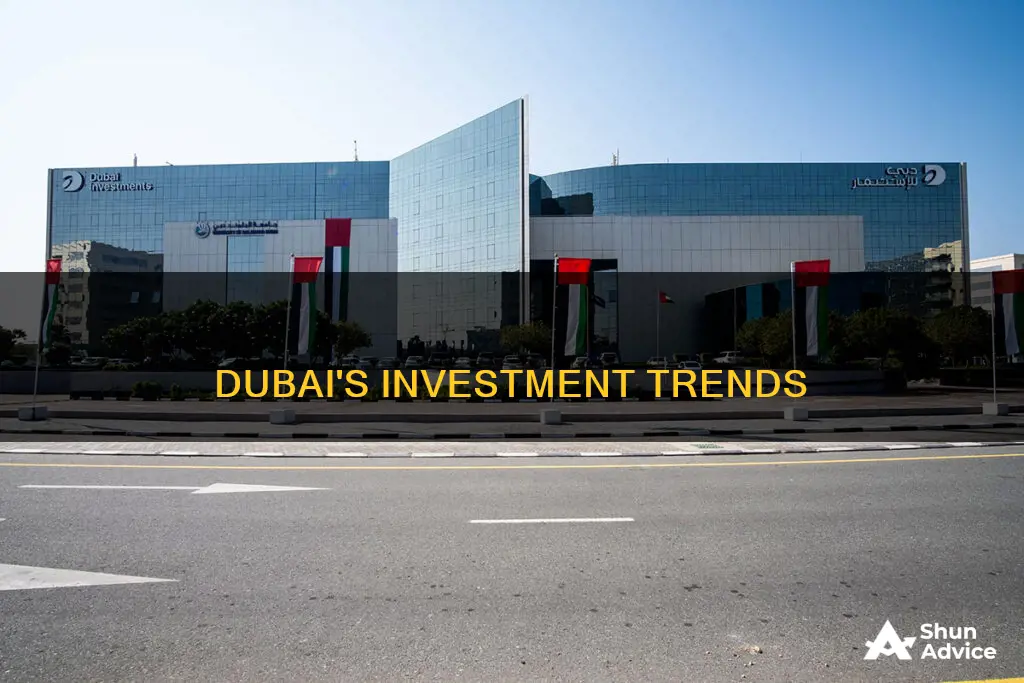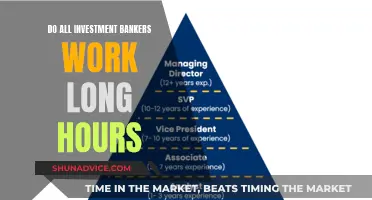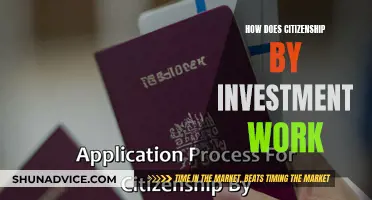
Dubai is a hub for international trade and business, attracting investors from all over the world. The city's economic agenda, D33, aims to double the size of its economy by 2033, making it one of the top three cities for living, investing, and working.
Dubai offers a wide range of investment opportunities, from minimal to heavy participation and short to long-term. Here are some of the popular ways to invest money in Dubai:
- Real estate and property investments: Dubai is known for its dynamic economy and thriving real estate market. The city is home to iconic buildings like the Burj Khalifa, the Atlantis Hotel, and the Palm. Foreigners can purchase, sell, and rent property in Dubai, making it a versatile way to invest.
- Business investments: Dubai has a thriving economy, high return potential, low taxes, and future growth plans, making it an attractive destination for entrepreneurs and business owners.
- Investing in funds, stocks, and shares: Expats can invest in stocks, shares, mutual funds, and bonds through the Dubai Financial Market (DFM) with minimal paperwork.
- Gold: Gold is a popular investment option in Dubai due to its outstanding resale value.
- Cryptocurrency: Cryptocurrency is a growing industry in Dubai, with the overall market capitalisation going over a trillion dollars.
- Forex trading: Forex trading is a popular investment market in Dubai, with over $5 trillion worth of currencies being traded daily.
| Characteristics | Values |
|---|---|
| Investment opportunities | Real estate, business, stocks, shares, bonds, mutual funds, gold, cryptocurrency, forex trading |
| Economic growth strategy | D33 (Dubai Economic Agenda 2033) aims to double the size of Dubai's economy by 2033 |
| Taxation | Low taxes on capital gains, no tax on interest earned from investments, no tax on capital gains for individuals, no dividend income tax |
| Business environment | Free-trade zones, low personal and corporate taxes, visa programmes for students and qualified individuals, relaxed tax norms |
| Global connectivity | World's busiest international airport, third largest port operator, advanced digital networks |
| Talent attraction | Competitive salaries, zero income tax, mandatory health insurance, end-of-service gratuity |

Real estate and property
Dubai's real estate market has seen a steady increase in prices, demand, and supply over the years. In 2022, there were 122,658 real estate transactions worth AED 528 billion (USD 143.75 billion), with year-on-year growth of 44.7% in quantity and 76.5% in value. The average price of properties in Dubai increased by 8.5–23%, depending on their type and status.
The high levels of security, excellent living conditions, developed infrastructure, proximity to the sea, and soft tax legislation attract qualified workers, businessmen, investors, and tourists to the city, stimulating the demand for housing. The emirate is currently home to around 90% expats.
Non-residents of the United Arab Emirates are free to buy property for investment or permanent residence. In 2006, the Dubai government approved a list of areas where foreigners have the right to buy apartments, houses, and commercial facilities with the right of private ownership. These areas were given the status of freehold zones. Most of the central residential communities of the city, as well as popular seaside resort areas and islands, are included in this list.
Today, the emirate is actively implementing new residential projects. Large development companies offer instalment plans to purchase houses and apartments under construction, with the possibility of payment over several years. Foreigners can also take out a loan to buy real estate in Dubai, but the down payment for non-residents is 50% of the property's value.
The most attractive areas for buying property in Dubai with high returns on investment are located in the central and coastal parts of the city. Freehold communities are the most sought-after for home purchases. These include popular neighbourhoods such as:
- Dubai Marina: A high-end waterfront community with a landscaped beach, a popular promenade, marinas, a shopping centre, and numerous restaurants.
- Palm Jumeirah: An artificial palm-shaped island that has become one of the most sought-after places to buy a villa or apartment in Dubai.
- Damac Lagoons: A new independent gated community with luxury villas and townhouses next to a pristine blue lagoon.
- Bluewaters Island: A small private island with apartment complexes, hotels, and a large private beach.
- Damac Hills 2: A quiet family neighbourhood where you can buy modern townhouses or villas in Dubai from developer Damac.
Analysts predict that property prices in Dubai in 2023 will increase by an average of 13.5% compared to 2022. Long-term rentals generally yield between 5% and 8% annually, while the annual income from short-term rentals can be up to 13%. The absence of several taxes, including income and property taxes, means investors can get a higher percentage of payback.
Dubai's real estate market is regulated by the government, which protects both tenants and landlords. The process of buying property in Dubai is simple and similar to purchasing real estate in most Western countries. There are no age restrictions, and residents can simply make an offer and acquire ownership. Foreigners can acquire freehold ownership without restrictions, including freehold property contracts, off-plan properties, usufruct rights, or a leasehold of up to 99 years. No visa is required.
However, foreigners can only purchase new title deeds for freehold properties within designated land plots as outlined by the Emirate of Dubai. There is also a 4% transfer fee payable to the Dubai Land Department when a property is transferred, as well as a monthly 'housing fee' equivalent to 5% of the average rental value of the area. Despite these fees, the low taxation in Dubai makes it a very attractive option for foreign investors.
Black Wealth: Investing Strategies
You may want to see also

Business
Dubai's thriving economy, high return potential, low personal and corporate taxes, and future growth plans make it an attractive place to invest in business.
Dubai's Economic Agenda "D33" aims to double the size of the emirate's economy by 2033, fostering competitiveness, diversification, and sustainability. This will position Dubai as a leading destination for global businesses, investment, and talent.
Real Estate and Property
Dubai's real estate market is globally renowned and offers ambitious development plans. Real estate investments can provide higher returns, value stability, and a low level of investment risk.
Construction
The construction industry in Dubai is expected to grow significantly, reaching USD 133.53 billion by 2026. This makes it a lucrative sector for generating sound revenues.
Retail and E-commerce
Dubai is a global destination for diverse goods and services, with a strategic location between the East and West. The city's free zones and favourable business environment make it attractive for companies wanting to trade internationally.
Healthcare and Pharmaceuticals
Dubai boasts world-class healthcare infrastructure, and its healthcare industry is expected to rise to $21.3 billion by 2021. This presents opportunities for investors to establish businesses in this sector.
Finance and Fintech
Dubai is a global financial hub, with the Dubai International Financial Centre (DIFC) fostering fintech innovation. The city's progressive regulatory environment, ease of doing business, and access to capital make it attractive for fintech companies, hedge funds, and asset management firms.
Creative Industries
Dubai is a trailblazer in the region's booming creative industries, including design, media, and entertainment. The city's pro-business environment and vibrant economy make it a beacon for creativity and culture, attracting global talent.
Start-ups and Entrepreneurship
Dubai's pro-business regulatory environment, strong network of investors, incubators, and accelerators make it a global hub for start-ups and entrepreneurs. The city's free zones and business-friendly ecosystem facilitate the process of going from licensing to launch.
Digital and Technology
Dubai is investing heavily in technology and smart city development, positioning itself as a hub for a sustainable and diverse economy. The city's ambition fuels both human and financial investment in technological innovation, making it a global leader in this field.
Food and Agriculture
Dubai is a pivotal trade gateway, and its restaurant market is predicted to grow at a CAGR of 5.22%. The city's tourism industry and large expatriate population contribute to the success of the F&B sector, making it a promising and profitable business area.
Transport and Logistics
With the world's busiest international airport and third-largest port operator, Dubai offers unparalleled connectivity. The transport business is expected to grow at a CAGR of 8.41%, reaching USD 31.41 billion by 2026, making it one of Dubai's most profitable sectors.
Dubai's diverse and dynamic business landscape offers a range of attractive investment opportunities across multiple sectors. The city's economic agenda, strategic location, and business-friendly environment make it a desirable destination for investors looking to capitalise on its growth and innovation.
Investment Strategies: How to Choose?
You may want to see also

Stocks, shares and bonds
Stocks and shares are a portion of ownership in a company. When companies want to raise money from the public, they divide their ownership into smaller units called shares. To own a portion of the company, an investor will buy a share or more. The investor buys the shares with the intention of earning dividends or selling the shares at a higher price. The place where the buying and selling of shares take place is called the stock market, also known as a stock exchange.
There are three stock exchange markets in the UAE where people can buy and sell stocks: the Dubai Financial Market (DFM), the Abu Dhabi Securities Exchange (ADX) and NASDAQ Dubai. However, with apps like Sarwa Trade, investors in the UAE can also trade on the New York Stock Exchange (NYSE).
To buy stocks in any of the three UAE exchanges, you need to register for your investor number (NIN) and then register with a broker. However, this process has been simplified by apps like Sarwa Trade, which allow investors to focus on the NYSE, the world's biggest exchange, offering access to the best corporations globally.
Stocks offer higher returns than bonds, savings accounts and real estate. For example, the S&P 500 Index, which tracks the performance of the top 500 stocks in the US, grew by 106.80% in the past five years, amounting to an annualised return of 21.36%. In comparison, the best annualised return on savings accounts in the UAE is 1.75%, while the yield on a 50-year treasury bond is 2.7%.
Stocks are a risky investment, as the price of selling depends on the market movement at the time. The prices of some stocks will appreciate in value, making you money, while the prices of others will depreciate, causing you to lose money. It's important to research a stock before buying it, by understanding its historical returns, risk, financial performance, management team and price volatility.
A bond is a debt instrument that governments and corporate companies use to raise money. There are three types of bonds: corporate bonds, treasury (national) bonds and municipal bonds. You can make money from bonds in two ways: interest payments and growth in the bond value. Bonds are considered less risky than stocks, but their returns are not as high.
The Dubai Bonds Company is in charge of National Bonds in Dubai, 50% owned by the Dubai government. A Sharia Compliant Scheme is available, allowing people to invest in bonds and profit from them. People can earn annual interest rates that are typically higher than those offered by banks in the United Arab Emirates. National Bonds can be purchased with a minimum of 100 dirhams and multiples of 100 dirhams, and can be redeemed at any exchange house after a minimum holding duration of 90 days.
Americans: Investors or Not?
You may want to see also

Gold
Dubai is known as the City of Gold, and gold has high cultural significance in the United Arab Emirates (UAE). Gold is a popular investment choice for those looking to diversify their portfolio, as its value tends to be relatively stable over the long term, and it often performs well when other asset classes, such as bonds and equities, are falling.
There are many ways for expats in the UAE to invest in gold, either directly (buying physical gold) or indirectly (via an investment fund or stocks and shares related to the gold market).
Buying Physical Gold
Dubai has a souk dedicated to gold, where hundreds of retailers sell jewellery, coins, and other gold items. These are typically sold by the gram, with the price dictated by the carat (the purity of the gold, with carats ranging from 9 or 10 to 24, with 24 being pure gold). The government regulates gold quality in Dubai, and there are strict rules for sellers, including checks and random lab tests. Sellers must also use the gold purity hallmark, so check for this before you buy gold.
The gold rate in the UAE adheres closely to international gold prices, ensuring that the gold you acquire is competitively priced. Additionally, the absence of taxes on gold purchases in Dubai can result in substantial savings compared to buying gold in other countries.
Investing in Gold-Related Stocks
An alternative to buying physical gold is to invest indirectly by buying stocks and shares of gold mining companies and firms that trade gold. Some of the biggest names in the mining sector include Rio Tinto, Glencore, and BHP, which are listed on the London Stock Exchange.
Invest Through Funds
There are several investment funds that focus on mining companies, providing indirect exposure to gold. These include BlackRock Gold and General, Ninety One Global Gold, and LF Ruffer Gold. Financial experts warn that these types of funds can be volatile, so they are more suitable for investors with a diversified portfolio and a higher risk appetite.
Buy Exchange-Traded Funds (ETFs)
If you want an investment that tracks the market price of gold (known as the gold spot price), there are a variety of exchange-traded funds (ETFs) available. Popular ETFs that track gold include iShares Physical Gold ETC, Invesco Physical Gold ETC, and WisdomTree Physical Gold. As ETFs are passive, index-tracking investments, they typically have lower management costs compared to actively managed investment funds.
Shiba Inu: Who's Invested?
You may want to see also

Cryptocurrency
The first cryptocurrency, Bitcoin, was introduced in 2008, and today there are over 10,000 cryptocurrencies in the world. The most popular among them are Bitcoin, Ethereum, Litecoin, and Bitcoin Cash.
The Central Bank of the UAE has not licensed cryptocurrencies or recognized them as legal tenders. However, there are no prohibitions against crypto assets, and they can be traded on crypto exchange platforms. UAE citizens can own, deposit, and trade cryptocurrencies.
Dubai's first crypto law – the Virtual Assets Regulation Law (VAL) – was passed on February 28, 2022. The emirate also formed an independent regulatory body – the Virtual Assets Regulatory Authority (VARA) – to govern the crypto sector in the region. The two main aims of the VAL are to protect investors and regulate cryptocurrencies in Dubai.
Dubai is home to several top cryptocurrency companies and startups, including:
- Fasset: A global digital asset gateway that provides unparalleled accessibility to the digital asset space.
- Belfrics Group: A blockchain-centric fintech firm specialized in blockchain technology and digital asset exchange solutions.
- AlphaCube: A platform that unlocks access for retail investors to the trillion-dollar algorithmic trading market.
- Iqracrypto: A leading crypto platform offering education, course certification, training, and learning.
- UPay Technology Limited: A blockchain technology company specializing in innovative cryptocurrency wallet and payment solutions.
Dubai has many policies that support blockchain technology, and it is emerging as one of the best markets for cryptocurrency trading. The city offers a favourable business environment, low taxes on capital gains, and ambitious development strategies.
The procedures for obtaining a crypto license are the same throughout the UAE. Here are the steps to obtain a cryptocurrency trading license in Dubai:
- Obtain the registration form from the free zone authority of your choice.
- Fill out and submit the registration form along with your company's legal documents and other required documents.
- Choose a suitable space for your business and prepare a rental agreement.
- Pay the crypto trading license fees and the space rent.
Your license will typically be issued within a week. You can then apply for a UAE residence visa and open a bank account in the country.
Middle-Aged Investors: Saving Enough?
You may want to see also
Frequently asked questions
Dubai is a global hub for international trade and business, with a thriving economy and ambitious development plans. It offers a highly favourable business environment, with low taxes on capital gains and minimal regulations on foreign investment.
Popular sectors for investment in Dubai include real estate, business, stocks, mutual funds, gold, and cryptocurrency.
Dubai offers high returns on investment, a relaxed tax environment, financial stability, and a high standard of living. It is also known for its safety, strong international connections, and world-class infrastructure.
It is important to understand the social, cultural, and economic factors in Dubai before investing. This includes health insurance, car insurance, the cost of living, alcohol consumption regulations, and social rules. Due diligence is also necessary to navigate the varying requirements across different Emirates and free-trade zones.







